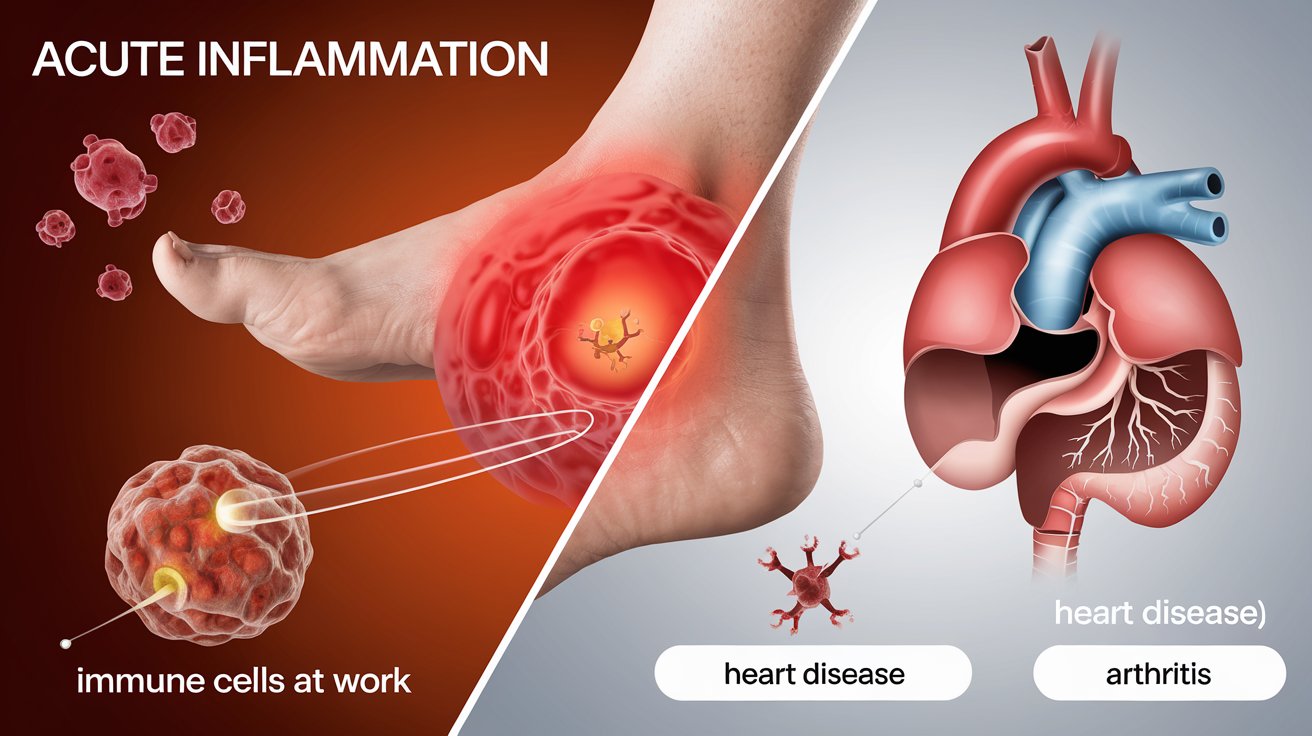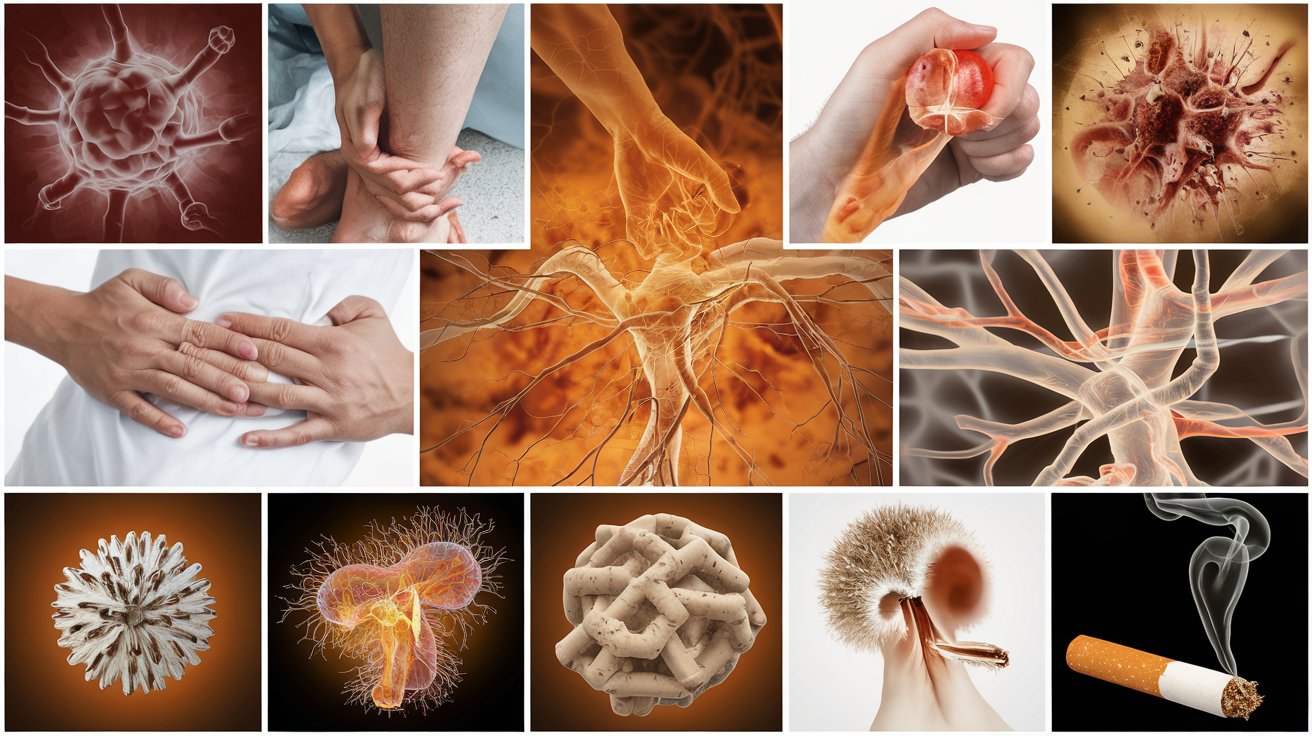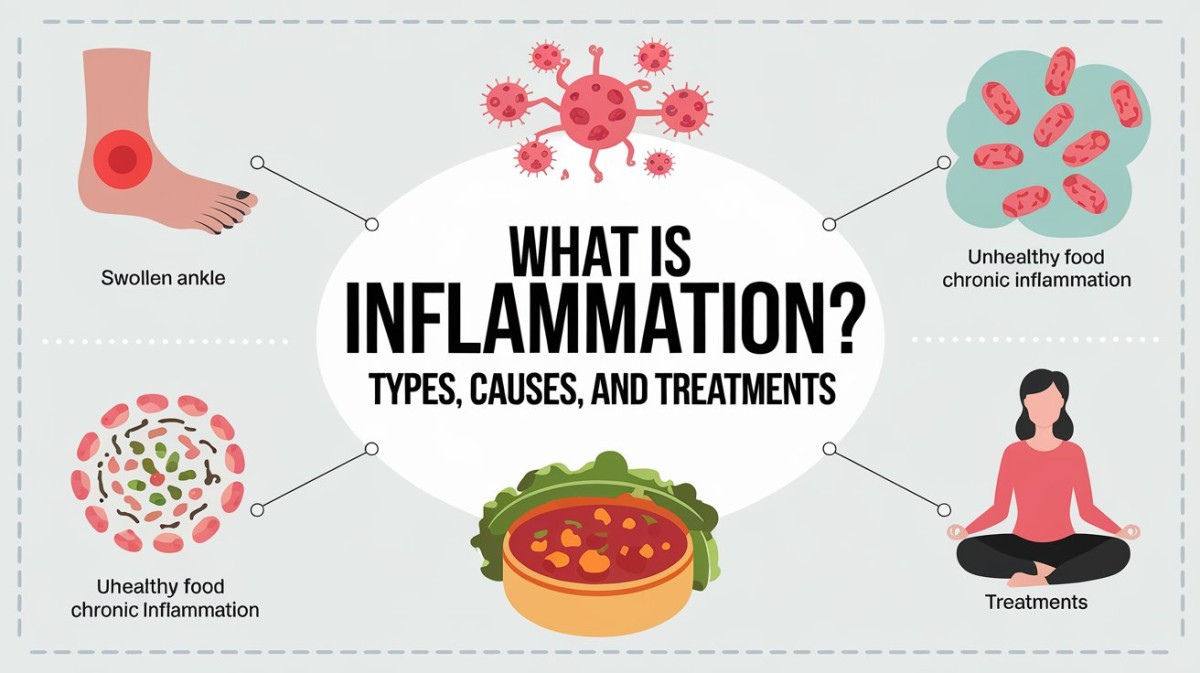Do you know when a minor scratch turns red or when a sprain gets swollen, that is the obvious sign of your body telling you it is fighting for you, and you need to rest. Inflammation is a protective mechanism in the body that occurs in response to an injury, infection or poison. However, as much as inflammation can help save a life, it becomes a challenge when it persists or when it shouldn’t occur. What is inflammation? And how does it impact health?
The purpose of this blog post is to help the reader understand what inflammation is, types of inflammation, the causes and how to manage or respond to it. Let’s dive in!
What Is Inflammation?

Inflammation can best be understood as the reaction of your immune system to an injury, infection, or harmful stimulus. This can be looked at as your body’s little ‘bells and whistle’ sign that gets set off when things are not quite as they should be. It aids in the wiping out of dead cells, other poisonous contents or microorganisms, thus creating a conducive atmosphere for the healing of the tissues. However, this type of inflammation becomes problematic if the body cannot produce it at the right time, such as during inflections; infections would spread without any restrictions; the body would not be able to heal wounded tissue.
But, it is important to know that not all inflammation is good for the body, in fact it can be very bad for the body and to the human body in particular. Sepsis lasts for hours to days, and acute inflammation results in curing the injured area while chronic inflammation is long-term, which in some cases may be for months or years and in the process contribute to some serious conditions.
Types of Inflammation

Inflammation is not a one-size-fits-all condition. It comes in two main types, each with different effects on the body:
1. Acute Inflammation
Whilst acute inflammation refers to a short-term response of the body to injury and infection. It can occur after you scraped your knee, twisted your ankle, or caught a cold. It usually comes with noticeable symptoms like:
❖ Redness
❖ Swelling
❖ Pain
❖ Heat
❖ Loss of function (like the stiffness you feel after a sprain)
Swelling plays an important role in cooking process and it is referred to as inflammation or acute inflammation. When the injury or the infection cord is managed, the inflammation settles down and your body becomes normal.
2. Chronic Inflammation
Chronic inflammation is low-grade and more dangerous in a sense compared to the acute inflammation. It happens where the inflammation process proceeds for a long time even after the possible cause had been eliminated. While acute inflammation is helpful, chronic inflammation is potentially tissue and organ destructive. It’s often a silent process, gradually contributing to conditions like:
❖ Diabetes
❖ Cancer
❖ Alzheimer's disease
Smoking, air and water pollutants, stress, or autoimmune disorders can initiate chronic processes and provoke the permanent activation of the inflammatory response.
Causes of Inflammation

There is inflammation that occurs due to multiple causes. Influences can be external, such as infections or injuries, and those arise from internal problems like the immune system collapse. Let’s take a look at some common causes of inflammation:
1. Infections
The bacteria, viruses, or fungi which enter the body results to production of chemical substances that lead to inflammation by the immune system. It is able to lead to redness, swelling or fever as your body increases its defense mechanisms to fight infections.
2. Injury
Acute inflammation is body’s physiologic response to physical insult. When you roll your ankle or bump your knee, your body dispatches blood and immune cells to the site of the injury to help fix the problem.
3. Autoimmune Diseases
For example, illness like lupus or rheumatoid arthritis where the body’s immune system begins to attack healthy cells as if they are foreign agents that need to be eliminated. Prolonged inflammation may lead to pobable and ongoing tissue tension.
4. Allergens
Inflammations occur when your immune system responds strongly to stimuli that are normally innocuous such as pollen or pet hair. Symptoms associated with inflammation includes; itching, swelling and sneezing amongst others.
5. Poor Diet
Poor eating habits involving foods with high content of refined sugars, processed foods and unhealthy fats enhance chronic inflammation. It is known that foods high in sugar, fats and soft drinks and other processed foods elevate the possibility of long term inflammation and conditions such as heart disease and obesity.
6. Stress
Stress does not make a burden on the mind only but also cause inflammatory reactions in the body. Chronic stress has been linked to Next traits: inflammation that causes heart disease, depression, and a weakened immune system.
7. Environmental Toxins
Airborne pollutants, chemicals that are inhaled also cause chronic inflammation, as well as smoking. As far as your body is concerned these toxins are Artificial, they trigger chronic inflammation every single moment.
Treatments for Inflammation

Acute inflammation has a tendency to remit by itself but managing chronic inflammation is a rather more complex process. Fortunately, there are many ways that one can seek remedy to the problem through administration of treatments that drain the inflammation. Let’s explore some of the most effective methods:
1. Anti-inflammatory Medications
Ibuprofen or aspirin is examples of Non-steroidal anti-inflammatory drugs that can be used to prevent inflammation and pain. In condition like arthritis, the physician may recommend stronger medicines including corticosteroids to control this aspect. It is however not medical advice and everyone should consult a doctor before taking any drug.
2. Dietary Changes
Yes it is very true that you can fight inflammation with food! It is said that shifting towards an anti-inflammatory diet that includes many fruits, vegetables, fatty fish and whole-grain products can decrease chronic inflammation. Some of the best anti-inflammatory foods include:
❖ Leafy greens (spinach, kale)
❖ Fatty fish (salmon, mackerel)
❖ Small fruits (blue berries, straw berries)
❖ Nuts (almonds, walnuts)
❖ Olive oil
That is why, on the one hand, patients should avoid such things as processed foods, trans fats, and excessive sugar because they trigger inflammation.
3. Exercise
Exercise also counters inflammation changes through better blood circulation, decreased amount of stored fat, and correct immune system function. It is recommended that on most of the days it is possible to take moderate exercises like walking, swimming etc for at least 30 minutes.
4. Stress Management
Stress is a primary cause of chronic inflammation, you should try to keep your stress levels as low as possible. People should do exercises as practices including Yoga, meditation, deep breathing exercises or go out into the nature to be free from stress that reduces inflammation levels in our systems.
5. Adequate Sleep
Lack of sleep can increase inflammation, make sure to get 7-9 hours of sleep every night. It is well known that sleep plays a crucial role in tissue repair as well as in regulation of inflammation processes.
6. Supplements
Omega-3 fatty acids, curcumin contained in turkey and green tea extract have been understood to have anti-inflammatory credit. It is important alway to consult your doctor before engaging in any supplement intake.
Conclusion
The inflammatory process is good for the human body when it is controlled because it heals but becomes detrimental when it goes overboard and causes chronic diseases. It is important then that you learn about inflammation in order not only to identify the types, causes, and treatments for inflammation so that you may be able to live a healthy life. Slight alterations to your way of life mean that you may simply be able to live an inflammation free and healthy life by merely adopting the following criteria:
Recall, there is nothing wrong with a bit of inflammation as long as it is within reasonable measure as it can severely affect your body. Check your health condition and, if you think you are experiencing chronic inflammation, consult your doctor.

